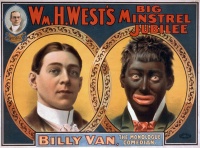Cultural appropriation
From The Art and Popular Culture Encyclopedia
(Difference between revisions)
| Revision as of 09:21, 17 March 2020 Jahsonic (Talk | contribs) ← Previous diff |
Current revision Jahsonic (Talk | contribs) |
||
| Line 41: | Line 41: | ||
| *[[Xenocentrism]] | *[[Xenocentrism]] | ||
| *[[white people adopting elements of African-American culture]] | *[[white people adopting elements of African-American culture]] | ||
| - | |||
| - | === African-American culture === | ||
| - | |||
| - | [[African-American culture]] | ||
| - | The term [[wigger]] (common spelling "wigga") is a slang term for a white person who adopts the mannerisms, [[African American Vernacular English|language]], and [[Hip hop fashion|fashions]] associated with [[African-American culture]], particularly [[hip hop]], and, in Britain, the [[Grime (music)|grime]] scene, often implying the imitation is being done badly, although usually with sincerity rather than mocking intent. Wigger is a [[portmanteau]] of ''white'' and ''[[nigger]]'' or ''[[nigga]],'' and the related term wangsta is a mashup of ''wannabe'' or ''white'', and ''[[gangsta rap|gangsta]]''. Among black hip-hop fans, the word "nigga" can sometimes be considered a friendly greeting, but when used by white people, it is usually viewed as offensive. "Wigger" may be derogatory, reflecting stereotypes of African-American, [[black British]], and white culture (when used as synonym of [[white trash]]). The term is sometimes used in a racist manner, by other white people to belittle the person perceived as "acting black", but it is widely used by African Americans like [[50 Cent]] offended by the wigga's perceived demeaning of black people and culture. | ||
| - | |||
| - | The phenomenon of white people adopting elements of black culture has been prevalent at least since [[slavery]] was [[Abolitionism|abolished]] in the [[Western world]]. The concept has been documented in the United States, Canada, the United Kingdom, Australia, and other white-majority countries. An early form of this was the ''white negro'' in the [[jazz]] and [[swing music]] scenes of the 1920s and 1930s, as examined in the 1957 [[Norman Mailer]] essay "[[The White Negro]]". It was later seen in the [[zoot suit]]er of the 1930s and 1940s, the [[Hipster (1940s subculture)|hipster]] of the 1940s, the [[beatnik]] of the 1950s–1960s, the [[blue-eyed soul]] of the 1970s, and the hip hop of the 1980s and 1990s. In 1993, an article in the UK newspaper ''[[The Independent]]'' described the phenomenon of white, middle-class kids who were "wannabe Blacks". 2005 saw the publication of ''[[Why White Kids Love Hip Hop: Wangstas, Wiggers, Wannabes, and the New Reality of Race in America]]'' by [[Bakari Kitwana]], "a culture critic who's been tracking American hip hop for years"''.'' | ||
| - | |||
| - | Robert A. Clift's documentary ''Blacking Up: Hip-Hop's Remix of Race and Identity'' questions white enthusiasts of black hip-hop culture. Clift's documentary examines "racial and cultural ownership and authenticity -- a path that begins with the stolen blackness seen in the success of [[Stephen Foster]], [[Al Jolson]], [[Benny Goodman]], [[Elvis Presley]], the [[Rolling Stones]] -- all the way up to [[Vanilla Ice]] (popular music's ur-wigger...) and [[Eminem]]." A review of the documentary refers to the wiggers as "white [[poseur]]s", and states that the term ''wigger'' "is used both proudly and derisively to describe white enthusiasts of black hip-hop culture". | ||
| - | |||
| - | The term "'''blackfishing'''" was popularised in 2018 by writer Wanna Thompson, describing female white social media [[Influencer marketing|influencers]] who adopt a look perceived to be [[Africa|African]] including braided hair, dark skin from tanning or make-up, full lips, and large thighs. Critics argue they take attention and opportunities from black influencers by appropriating their aesthetic and have likened the trend to [[blackface]]. | ||
| - | |||
| - | |||
| - | |||
| {{GFDL}} | {{GFDL}} | ||
Current revision

This page Cultural appropriation is part of the culture series
Illustration: A 1900 William H. West minstrel show poster, originally published by the Strobridge Litho Co., shows the transformation from white to "black".
Illustration: A 1900 William H. West minstrel show poster, originally published by the Strobridge Litho Co., shows the transformation from white to "black".
|
Related e |
|
Featured: |
Cultural appropriation is the adoption or appropriation of some specific elements of one culture by a different cultural group. It denotes acculturation or assimilation, but often connotes a negative view towards acculturation from a minority culture by a dominant culture. It can include the introduction of forms of dress or personal adornment, music and art, religion, language, or social behavior. These elements, once removed from their indigenous cultural contexts, may take on meanings that are significantly divergent from, or merely less nuanced than, those they originally held. Or, they may be stripped of meaning altogether.
[edit]
Examples
- African art's influence on Western art
- Cultural appropriation in western music
- Primitivism in western art
[edit]
See also
- Acculturation
- Appropriation
- Blackface
- Civilizing mission
- Co-optation
- Colonialism
- Cultural assimilation
- Cultural appropriation in Western music
- Cultural diffusion
- Cultural diversity
- Cultural imperialism
- Declaration on the Rights of Indigenous Peoples
- Détournement
- Enculturation
- Exoticism
- Imperialism
- Isolationism
- Indigenous intellectual property
- Noble savage
- Plastic Paddy
- Plastic shaman
- Poseur
- Reappropriation
- Recuperation (sociology)
- Syncretism
- Transculturation
- Westernisation
- Wigger
- Xenocentrism
- white people adopting elements of African-American culture
Unless indicated otherwise, the text in this article is either based on Wikipedia article "Cultural appropriation" or another language Wikipedia page thereof used under the terms of the GNU Free Documentation License; or on research by Jahsonic and friends. See Art and Popular Culture's copyright notice.


